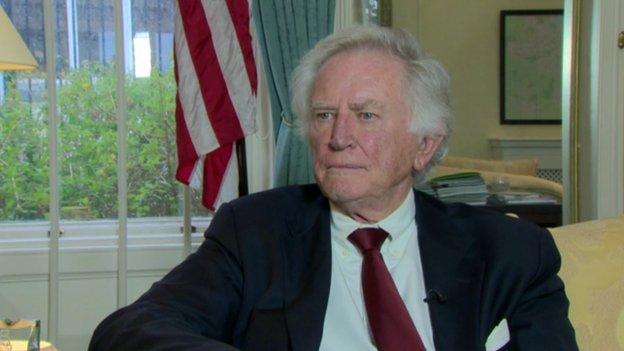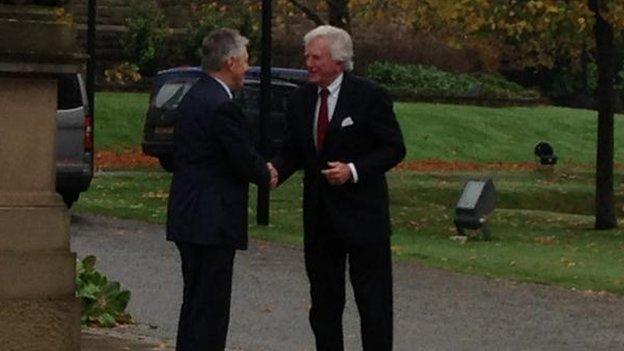Gary Hart: US envoy says America 'wants to help' in Northern Ireland talks
- Published

Former US senator Gary Hart said America remained "disproportionately interested" in Northern Ireland
The US envoy to Northern Ireland's political talks has said he has asked the parties how the American government can best help the process.
Former US senator Gary Hart said America remained "disproportionately interested" in Northern Ireland.
He is in Belfast to assist in political talks over issues including flags, parades and the legacy of the Troubles.
He compared the complexity of the talks to previous US negotiations with the Soviet Union on nuclear disarmament.
In his first interviews since being appointed as US envoy to the Northern Ireland talks last week, Mr Hart said: "We're in the complicated position of wanting to help but not wanting to be intrusive. It's a delicate, often diplomatic endeavour."
Earlier on Thursday, Northern Ireland's First Minister Peter Robinson called for "encouragement but not direct involvement" from the US.
Mr Robinson, who leads the Democratic Unionist Party (DUP) made his remarks after his first meeting with Mr Hart on Thursday morning.
However, nationalist politicians have consistently called for greater involvement from the US administration in Northern Ireland.
Mr Hart told the BBC his role was "still being defined", but that he envisaged visiting Northern Ireland "frequently".
'Sectarian divisions'
Prime Minister David Cameron spoke to US Vice President Joe Biden about the political talks on Thursday.
A statement released from Downing Street said: "The Prime Minister and the Vice President agreed on the importance of the parties engaging fully in the process and were positive that progress could be made.
"The Vice President noted that Senator Gary Hart, Secretary Kerry's special representative, was in Northern Ireland and they agreed that the US and UK would continue to work closely to support the parties' efforts in the talks process."
Over the last two days, the US envoy has met the five parties in the Northern Ireland Executive and the British and Irish governments.
"The question I've been asking all the parties is: how can we help?" Mr Hart said.
"Should we offer advice, should we participate in the talks, how should we best facilitate? As things evolve, we'll figure out the way to do that."
Senator Hart, who twice ran to be the Democrats' candidate for US president in the 1980s, said America remained "disproportionately interested" in Northern Ireland politics.
He explained: "There are very few places on earth of this scope and size where government and the people of America pay more attention."
Mr Hart has been involved in foreign affairs and security issues for many years.
When asked how complex Northern Ireland's issues were in comparison with others he had dealt with internationally, he replied: "It's at least as complicated as our very complicated talks with the Soviet Union over the years - and I don't mean that facetiously.
"Those talks were very straightforward - 'you have this number of nuclear weapons, we have that number of nuclear weapons, how do we get rid of them?'
"Here you have all the legacy, all the history, the sectarian divisions. I think it's to the credit of the people that you've made the progress you've had."
'Trade-offs'
Mr Hart said if there was "complete deadlock" in the Stormont talks, and the participants wanted the US to play a more active role, he could foresee the American government putting ideas and possibly "comprehensive proposals" on the table.
However, he emphasised these proposals would be "for discussion", not "resolution."
Last year, another American diplomat, Dr Richard Haass, chaired a round of talks on flags, parades and the legacy of the Troubles.
But the Haass negotiations did not produce an agreement.
The current round of talks are revisiting the issues from the Haass process, but parties are also discussing other matters.
These include welfare reform, budgets and possible changes to the way the Northern Ireland Assembly and Executive work.
Comparing the current negotiations to the Haass talks, Mr Hart said: "The scope has widened, and that works both ways.
"It complicates matters, but it also gives you more chance to do trade-offs."
He will return to his home in the US state of Colorado on Friday.
- Published30 October 2014
